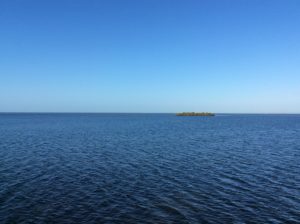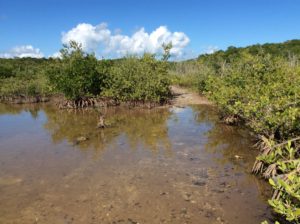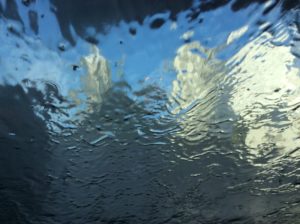 I caught an episode of The Twilight Zone last night. A grade school-aged sister and brother sit beside a pool with wet hair. Towels drape their bony shoulders. The father looks dressed for work; the mom looks as if she is off to the country club for mahjong and Mai Tais. The parents glare at one another and give the children the news: We don’t like each other, and we’ve grown weary of this charade. We are getting a divorce. You will either live with Mom or Dad. You choose.
I caught an episode of The Twilight Zone last night. A grade school-aged sister and brother sit beside a pool with wet hair. Towels drape their bony shoulders. The father looks dressed for work; the mom looks as if she is off to the country club for mahjong and Mai Tais. The parents glare at one another and give the children the news: We don’t like each other, and we’ve grown weary of this charade. We are getting a divorce. You will either live with Mom or Dad. You choose.
The kids freak out and begin trying to stitch their lives back together. They pledge that they will display perfect behavior if the parents will stay together. When it becomes clear their words do not have the desired effect, the children turn to each other and say, “Let’s go to a place where they can’t get us.”
They walk to the pool, dive into the deep end, submerge and disappear into the water. They don’t drown; they vanish. Rod Serling comes on to ominously intone that the pool is a mysterious portal to somewhere else. It’s no mystery to me.
The parents stand by the side of the pool, recoiling from the water as if it would somehow sully them to jump in. Maybe putting on their grown-up clothes and playing their grown-up reindeer games made them forget: Water has the power to make the world disappear.
 A week ago I zoomed on the Overseas Highway from the Florida Keys back to Miami Beach. I noticed one of the overlookable brown signs that mark state parks and wildlife refuges. The sign was obscured behind enthusiastic vegetation, but it caught my eye, and I made a U-turn. Mine was the only car in the tiny parking lot.
A week ago I zoomed on the Overseas Highway from the Florida Keys back to Miami Beach. I noticed one of the overlookable brown signs that mark state parks and wildlife refuges. The sign was obscured behind enthusiastic vegetation, but it caught my eye, and I made a U-turn. Mine was the only car in the tiny parking lot.
Two portly park attendants sit behind a folding table, straightening brochures. “Do you know anything about the Key Largo Hammock Botanical State Park?” asks one of the attendants.
I did not.
Only two trails snake through the small park that was created on land saved from condominium development by a zealous environmentalist in the ’80s. I choose the longer trail, the one that will take me from under the canopy of the hammock to the thickets of mangroves at the water’s edge. “Some of that trail is submerged,” the attendant warns. “You will be at least ankle deep in salt water.”
No mosquitos, 80-degree sunshine, edible clouds overhead. An hour later, water and land blur their boundaries, and I wade beside clumps of buttonwood mangrove balancing on their spindly legs. Spongy mud and warm water coat the trail. Minnows skitter over my toes. I am in a wetland, a word that marries land and water, a place of in between that creates its own ecosystem, a place that Venn diagrams the fluid and the fixed.
After about 15 minutes of wet walking, I step again onto a dry trail. My footfall squeaks as water oozes from my sandals. On this hike the water has told me yet again: My lines of certitude between this and that, between beginning and end, between here and there is folly. Wet, squishy folly.
 It is 12 years ago on the space time continuum most of us adhere to. I am newish to Flagstaff, giving it my Girl Scout all to fit it, but we flatlanders go through our paces when we leave sea level and move to a place where water is less like a chatty, drunken party guest who won’t go away and more like a punitive elder relative who won’t give it up.
It is 12 years ago on the space time continuum most of us adhere to. I am newish to Flagstaff, giving it my Girl Scout all to fit it, but we flatlanders go through our paces when we leave sea level and move to a place where water is less like a chatty, drunken party guest who won’t go away and more like a punitive elder relative who won’t give it up.
I am a teacher at Northland Prep, and on this day I am leading my creative writing class through some assignment. What I remember is that their heads are bent over their notebooks, and they are preoccupied with creating and writing.
It begins to rain. I can see it outside the window that is behind the rows of desks. One of the students hears the rainfall and cries out as if he has been stranded and spies a rescue plane overhead. “Rain!”
As if in an act of reverence, the students calmly put down their pens and walk to the windows. None asks permission or seeks my eyes for affirmation. They stand side by side and press their faces and hands against the glass, opening themselves toward the water, the water that falls from the sky. They are quiet and watchful, two adjectives not usually deployed when talking about adolescents.
In a few moments they make their way back to their seats, unprompted by me, and continue writing their assignment. We didn’t talk about what had happened. I still think about that day, that rain, that hushed atmosphere of awe it created in those children. Stop, the water said. Look. Listen.
And we did.

